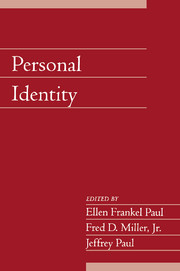Book contents
- Frontmatter
- Contents
- Introduction
- Acknowledgments
- Contributors
- Experience, Agency, and Personal Identity
- When Does a Person Begin?
- Persons, Social Agency, and Constitution
- Hylemorphic Dualism
- Personal Identity and Self-Ownership
- Self-Conception and Personal Identity: Revisiting Parfit and Lewis with an Eye on the Grip of the Unity Reaction
- The Normativity of Self-Grounded Reason
- Rationality Means Being Willing to Say You're Sorry
- Personal Identity and Postmortem Survival
- “The Thing I Am”: Personal Identity in Aquinas and Shakespeare
- Moral Status and Personal Identity: Clones, Embryos, and Future Generations
- The Identity of Identity: Moral and Legal Aspects of Technological Self-Transformation
- Index
Introduction
Published online by Cambridge University Press: 05 July 2014
- Frontmatter
- Contents
- Introduction
- Acknowledgments
- Contributors
- Experience, Agency, and Personal Identity
- When Does a Person Begin?
- Persons, Social Agency, and Constitution
- Hylemorphic Dualism
- Personal Identity and Self-Ownership
- Self-Conception and Personal Identity: Revisiting Parfit and Lewis with an Eye on the Grip of the Unity Reaction
- The Normativity of Self-Grounded Reason
- Rationality Means Being Willing to Say You're Sorry
- Personal Identity and Postmortem Survival
- “The Thing I Am”: Personal Identity in Aquinas and Shakespeare
- Moral Status and Personal Identity: Clones, Embryos, and Future Generations
- The Identity of Identity: Moral and Legal Aspects of Technological Self-Transformation
- Index
Summary
What is a person? What makes me the same person today that I was yesterday or will be tomorrow? These are questions that philosophers have long pondered, and the history of this topic, as in other areas of philosophy, is a series of footnotes to Plato. In Plato's Symposium, Socrates recalls the argument he heard from Diotima that nature is governed by the principle of love, which manifests itself in the desire of mortal nature to live forever and to be immortal so far as possible. Living organisms manage to achieve some measure of immortality through sexual reproduction. On Diotima's view, however, something like this also happens within the lifetime of each organism:
Even while each living thing is said to be alive and to be the same—as a person is said to be the same from childhood till he turns into an old man—even then he never consists of the same things, though he is called the same, but he is always being renewed and in other respects passing away, in his hair and flesh and bones and blood and his entire body. And it's not just in his body, but in his soul too, for none of his manners, customs, opinions, desires, pleasures, pains, or fears ever remains the same, but some are coming to be in him while others are passing away.… And in that way everything mortal is preserved, not, like the divine, by always being the same in every way, but because what is departing and aging leaves behind something new, something such as it had been.
- Type
- Chapter
- Information
- Personal Identity , pp. vii - xvPublisher: Cambridge University PressPrint publication year: 2005

